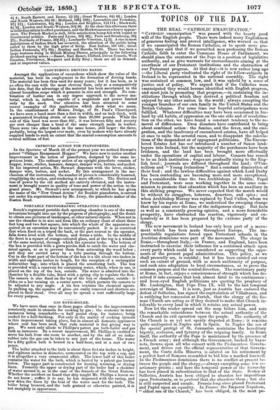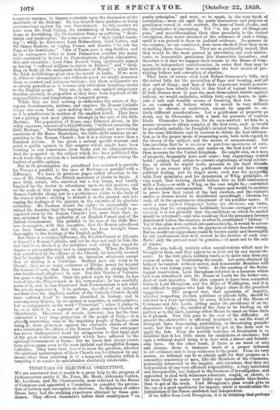TOPICS OF THE DAY.
THE REAL " CATHOLIC EMANCIPATION."
" CATHouo emancipation " was passed with the hearty good will of the English people. There were indeed many Englishmen of generous feeling and proved intelligence, who warned us that if we emancipated the Roman Catholics, or to speak more pre- cisely, they said that if we permitted men professing the Roman Catholic faith to enter the Commons House of Parliament, we should place the creatures of the Pope in a position of legislative authority, and so give warrants for encroachments aiming at the overthrow of our Protestant institutions and the obstruction of our Protestant progress. At that day—it is now rather long —the Liberal party vindicated the right of its fellow-subjects in Ireland to be represented in the national assembly. The right was sustained at common law, and it was upheld by a sense of justice and of policy. We argued that if the Catholics were emancipated they would become identified with English progress, and must join in promoting that progress,—in sustaining the in- stitutions through which they derived a political freedom not enjoyed by any other nation in the world ; always excepting the younger branches of our own family in the United States and the British Colonies. For some time our hopeful anticipations were fulfilled. Whatever difficulties may have been occasioned in Ire- land by old habits, of oppression on the one aide and of recalcitra- tion on the other, we have found a constant tendency to the re- moval of differences. Even disasters have contributed to bring about combined action : the famine, and the fever, and the emi- gration, and the insolvency of encumbered estates, have all helped at once to unite the severed races, and to disappoint the calcula-
tions of the despondent or of oppugnant politicians. The Encum- bered Estates Act has not introduced a number of Saxon land- buyers into Ireland, but the majority of the purchasers have been Irishmen, and the land has been brought more effectually under the operations of capital and labour. Conaore has ceased to be an Irish institution ; wages are gradually rising to the Eng- lish level ; journals are diffused throughout the land ; O'Con- nellism and "Young Irelandiam " find a constant diminution of their food ; and the lawless difficulties against which Lord Derby has been contending are becoming more and more exceptional. For a considerable time the two Archbishops of Dublin, Papal and Protestant, were seen working together in the same com- mission to promote that education which has been an auxiliary in this striking progress. We never expected that the march would be without its stragglers, loiterers, deserters, and spies ; and when Archbishop Murray was replaced by Paul Cullen, whom we knew by his repute at Rome, we understood the sweeping change that must come over the face of the indigenous clergy. But facts as well as a constantly growing opinion, and a more formidable prosperity, have obstructed the reaction, vigorously and ex- tensively as it has been prepared by the extreme party of the clergy.
The new movement in Ireland has only been part of a move- ment which has been made throughout Europe. The im- practicable regulations forced upon Protestant schools in the Austrian dominions were part of the movement. The clergy in Rome,—throughout Italy,—in France, and England, have been instructed to exercise their influence for a continued attack upon every party which could be considered as supporting the oppo- nents of the present papal administration. This policy, as we shall presently see, is suicidal ; but it has been carried out over such an extent of ground, with so much uniformity of purpose, and such nice adaptation to local circumstances, as to prove the common purpose and the central direction. The reactionary party at Rome, in fact, enjoys a consciousness of strength which has de- ceived it into excesses that look almost fatal to its continuance ; and keen-eyed English politicians are quoting the prophecy of Mr. Lushington, that Pope Pius IX. will be the last temporal sovereign of Rome. It is now, just as Austria has endured the defeat of Solferino, has signed the capitulation of Villafranca, and is ratifying her concession at Zurich, that the clergy of the Ro- man Church are acting as if they desired to make that Church in- tolerable to every land in which it retains any actual power. Now let the reader spread out the map before him, and note the remarkable coincidence between the actual authority of the Church and its evil operation upon the people. The authority of the Church is as yet not openly disputed at Rome ; it remains quite undisputed in Naples and in Spain. In Naples the son of the special protégé of St. Januariva maintains the hereditary bigotry, seclusion, and tyranny of the reigning family. In Rome itself, the authority of the Pope is maintained by the presence of a French army ; and although the Government, backed by bayo- nets, frowns upon all who consort with the Piedmontese Govern- ment, and drives out the official representative of that Govern- ment, the Conte della Minerva is saluted on his retirement by a perfect host of Romans assembled to bid him a marked farewell. In the Piedmontese dominions there is no conflict at present be- tween the people and the clergy,—always excepting some few re- actionary priests ; and here the temporal power of the hierarchy has been placed in subordination to that of the State. Beaten at Solferino, Austria has been obliged to abandon her impositions upon Protestants, or to pretend that she abandons them ; but she is still suspected and unsafe. Prussia long since placed Protestant' and Papist upon an equality. In France the Emperor Napoleon, " eldest son of the Church," has been obliged, in the most pe- remptory manner, to impose restraints upon the discussion of the mandates of the Bishops. He has treated those prelates as being contumacious against his own Government. In this country we have seen Dr. Paul Cullen, the Archbishop of Dublin, painting Rome as flourishing, the Piedmontese States as suffering " destie tntion and bankruptcy," the consequence of " their infidel teach- ing "; while he denounces Lord Malmesbury, Lord Loftus, and Sir James Hudson, as urging France and Austria " to rob the Pope of his dominions." John of Tuam goes a step further, and in. an outrageous letter to Lord Palmerston ascribes. tthe many evils sustained. by Ireland to Protestantism, English administra- tion and education ; Lord John Russell being specifically named as having " suffered millions to starve in Ireland," and " shed- dinn on Italy all the malignant influence of Hecate" ; while both Irish rish Archbishops gloat over the revolt in India. If we were in different circumstances and different mood we might denounce them as avowed. and infamous traitors ; but these malignants are so utterly powerless as to become only ridiculous laughing-stocks to the English people. They are, in fact, safe against sanguinary reaction precisely in proportion as they have been deprived of the responsibilities and temptations of temporal power. While they are thus seeking to undermine the action of Eu- ropean Governments, nations, and empires, the Roman Catholic clergy also seem bent upon making their authority as ridiculous as it is mischievous in matters of the smallest detail. They have had a glaring and most piteous triumph in the case of the little Mortara. The population of Rome, says Edmund About, in his witty exposure, consists of 3,425,600 souls, " without counting the little Mortara." Notwithstanding the admirable and persevering exertions of Sir Moses Montefiore, the little child remains an ac- quisition to the Roman Church ; but it is a victory worse than a hundred defeats. It has given a certain specific warrant and point to public opinion in this country which might have been wanting in our remoteness from Rome and its administration. And the memorial on. the subject which has been published this week reads like a section in a national directory, enumerating the leaders of public opinion. But in its presumption the priesthood. has ventured to provide fur Europe a parallel to the case of Mortara—a parallel with a difference. We have in previous pages called. attention to the case of Mr. Graham, the British merchant at Denia in Spain. A poor little infant, who survived but a few hours, was hastily baptized by the doctor in attendance upon, its sick mother; and on the score of that baptism, as in the case of the Mortara, the Roman Catholic clergy put in a posthumous claim to the body of the buried infant ; seeking to disturb it in the ground, and out- raging the feelings of the parents in the exercise of its absolute authority. Mr. Graham denied the right ; he successfully sus- tained the doctrine that the baptism of a Protestant Church is re- cognized even by the Roman Church ; but, more than that, he was sustained by the authority of an English Consul and: of the British Government. The parallel to the case of the little Mor- tara is complete, with this exception, that the Roman priesthood has been beaten ; and that the case has been brought home thoroughly to the feelings of the English public.
But there is a further difference, the. English Consul at Alicante is himself a Roman Catholic, and yet he does not seek to hide the fact that he is shocked at the mistaken zeal which has urged its dogma so presumptuously and so dangerously. When. the Doctor was catechized by the officers of the Church, he honestly avowed that he baptized the child with no intention whatever, except that of snaking it a Christian. Medical men are wont to be liberal ; they see so many, evidences of Divine power far beyond the bounds of sect, that they have a difficulty in pledging their own intellectual allegiance to sect. But this Doctor of Valencia has gone a step further. Since the priest made his claim, he-has looked into the Prayer-book in his vernacular ; he has carefully perused it, and he has discovered that Protestantism is not what the priests represent it. It is, perhaps, the effect of an unlucky, accident that the Anglican section of the Catholic Church should have suffered itself to become identified in history, and in contemporary history, by an epithet so negative, so undescriptive, but so antagonistic, as.the word. "Protestant" ; when it claims to be, as hi fact it is, a segment of the great common Church of Christianity. The course of events, however, has for the time converted a very large proportion of the people of Italy,—it is alreadig converting some of the inquiring people of Spain,—into being .de facto protesters against the excessive claims of those who administer the affairs of the Roman Church. Our own paper has never distinguished itself for antagonism to that large part of the great Christian community -which have adhered to the spiritual Government of Rome ; but we know that recent evente have given pause even to the most faithful and thoughtful Roman. Catholics. They have been forced to moot the question, whether the spiritual maintenance of their Church can be obtained by any means other than relieving it of a temporal authority which is tempting it to render its ministration absolutely intolerable.



























 Previous page
Previous page